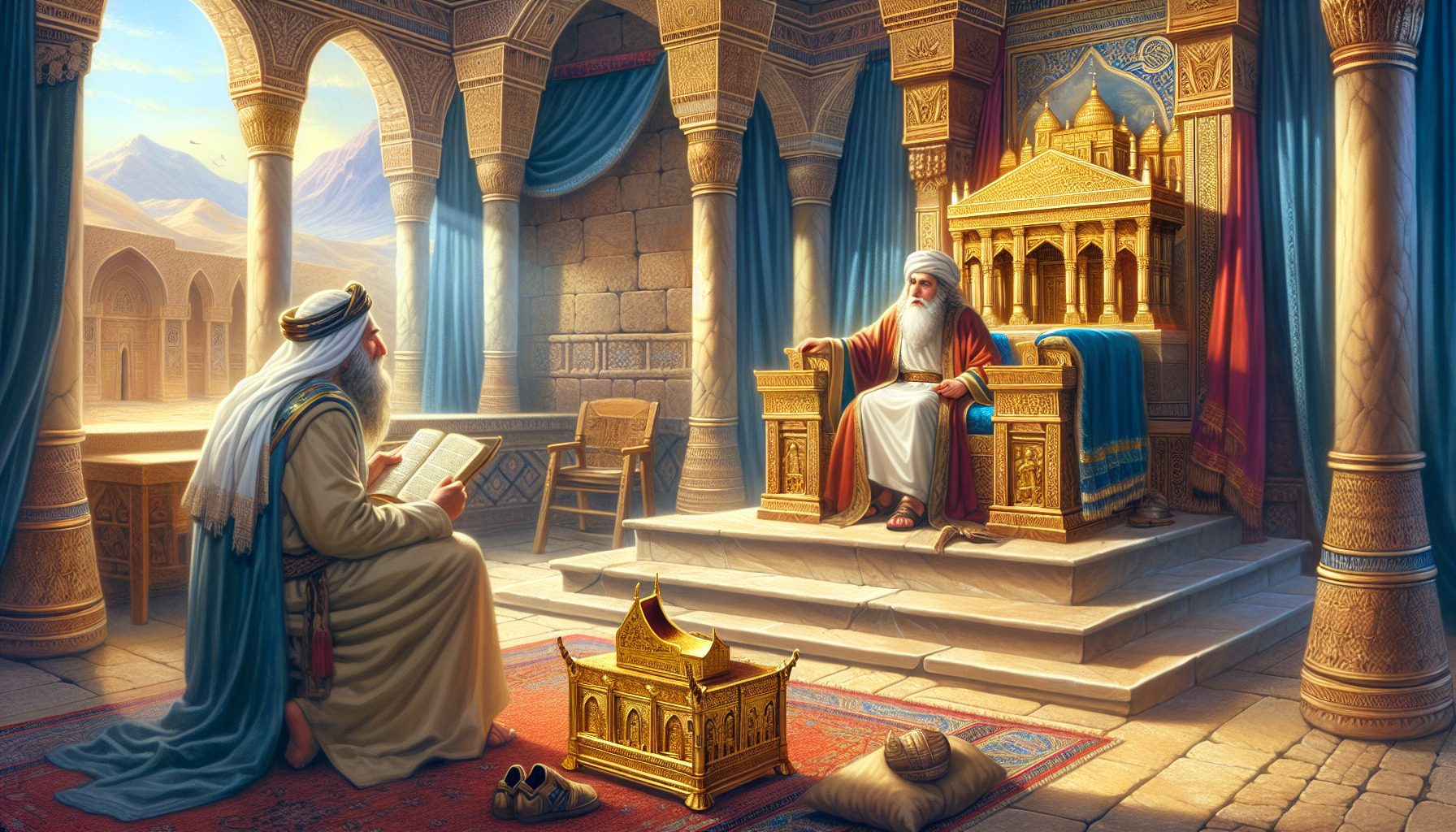**The Reign of King Ahaz: A Tale of Idolatry and Judgment**
In the days when the kingdom of Judah was ruled by the descendants of David, there arose a king whose heart strayed far from the ways of the Lord. His name was Ahaz, the son of Jotham, and he reigned in Jerusalem for sixteen years. But unlike his father, who had walked uprightly before the Lord, Ahaz did what was evil in the sight of the Almighty, forsaking the commandments and leading the people into great sin.
### **The Depths of Ahaz’s Idolatry**
From the very beginning of his reign, Ahaz turned away from the God of his fathers. He walked in the detestable practices of the kings of Israel, even making molten images for the Baals—false gods who demanded the worship that belonged to the Lord alone. In the valleys and on every high hill, beneath the shade of spreading trees, Ahaz erected altars to these idols, offering incense in defiance of the Law.
But his wickedness did not stop there. In the Valley of the Son of Hinnom, where the fires of Topheth burned, Ahaz committed the most abominable of acts—he sacrificed his own sons in the fire, following the horrific customs of the surrounding nations. The smoke of his offerings rose not in devotion to the Lord, but in service to demons, provoking the Holy One of Israel to righteous anger.
### **Judgment Falls Upon Judah**
Because of Ahaz’s great sin, the Lord delivered Judah into the hands of its enemies. The king of Syria, Rezin, marched against Jerusalem, striking down many and carrying away a great number of captives. At the same time, Pekah, king of Israel, invaded Judah with a mighty army, slaying one hundred and twenty thousand valiant warriors in a single day—a devastating blow to the people of God.
The slaughter was immense, for the Lord had allowed it as punishment for Judah’s unfaithfulness. The Israelite army, though themselves disobedient to God, became the instrument of His judgment. They took captive two hundred thousand women, sons, and daughters from Judah, along with much spoil, and brought them to Samaria.
### **The Prophet’s Rebuke and Mercy**
But the Lord, in His mercy, would not allow His wrath to consume Judah completely. A prophet of God named Oded stood before the army of Israel as they returned with their captives. His voice thundered with divine authority:
*”Behold, because the Lord God of your fathers was angry with Judah, He has delivered them into your hand, but you have slaughtered them in a rage that reaches up to heaven! And now you intend to keep the people of Judah and Jerusalem as male and female slaves for yourselves. Are you not also guilty before the Lord your God?”*
Convicted by his words, the leaders of Ephraim—men of influence among the Israelites—rose up and declared, *”You shall not bring the captives here, for we have already trespassed against the Lord. Do not add to our sins, lest His fierce anger be kindled against us!”*
Then the armed men left the spoil and the captives before the princes and all the assembly. And those who were appointed took the captives, clothed those who were naked, provided sandals for their feet, gave them food and drink, anointed them with oil, and carried all the feeble among them on donkeys. They brought them to their kinsmen at Jericho, the City of Palms, and then returned to Samaria.
### **Ahaz’s Further Downfall**
Yet even after such mercy, Ahaz did not repent. Instead, in his distress, he grew even more faithless. When the Edomites came and attacked Judah, carrying away captives, and when the Philistines raided the cities of the lowland and the Negev, Ahaz did not seek the Lord. Instead, he sought help from the king of Assyria, sending him treasures from the house of the Lord and the royal palace as tribute.
But the Assyrian king, Tiglath-Pileser, did not come to his aid as Ahaz had hoped. Instead, he oppressed him further, taking more wealth and offering no deliverance. In his desperation, Ahaz stripped the gold from the doors of the Temple and cut away the sacred vessels, giving them to the Assyrian ruler—yet still, no relief came.
### **The Final Blasphemy**
In his hardened heart, Ahaz reasoned that if the gods of Damascus had helped the Syrians, perhaps they would aid him as well. So he took the pagan altars from the conquered city and set them up in Jerusalem, replacing the altar of the Lord with a foreign design. He commanded the priests to offer sacrifices upon it, defiling the holy place.
He shut the doors of the Temple, extinguishing the lampstand and ceasing the daily offerings. In every city of Judah, he built high places to burn incense to other gods, provoking the Lord to anger.
### **The End of a Wicked Reign**
Thus, Ahaz died in his wickedness, and though he was buried in Jerusalem, he was not laid in the tombs of the kings of Israel. His son Hezekiah reigned in his place, and unlike his father, he would turn back to the Lord with all his heart.
But the legacy of Ahaz remained as a warning—a king who, when humbled by God’s judgment, only sank deeper into sin. His life stood as a testament to the truth that those who forsake the Lord will be forsaken, but those who seek Him will find mercy.
And so the chronicles of Judah recorded his reign—a reign marked not by glory, but by disgrace, not by faithfulness, but by idolatry, a dark shadow before the dawn of revival that would come in the days of Hezekiah.




